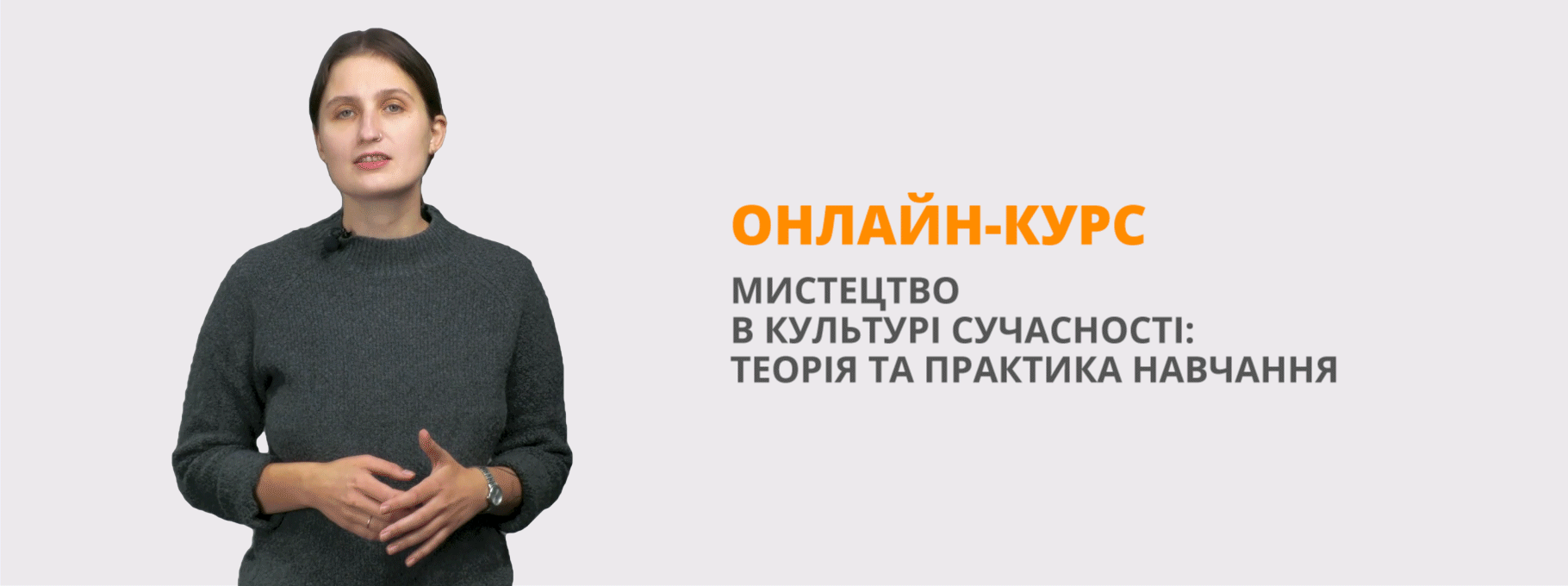Конспект з англійської мови до ЗНО
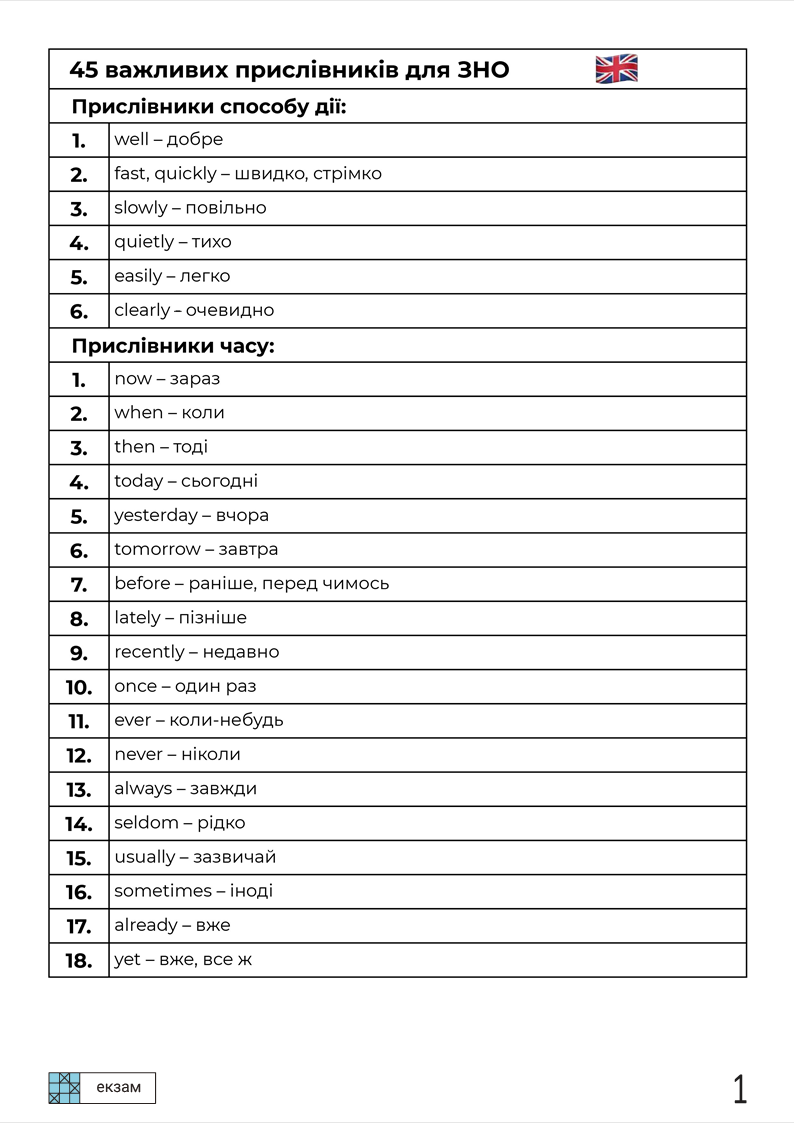
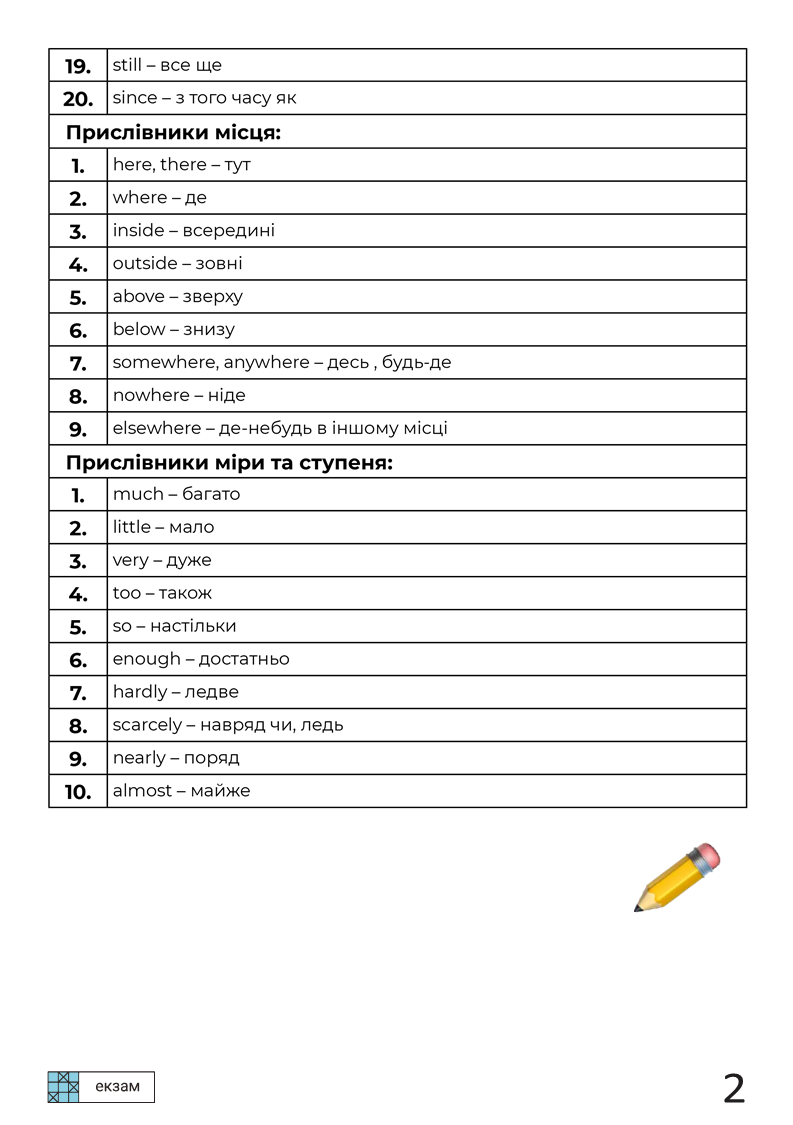 |

50 ФРАЗ, АРТИКЛЬ ЯКИХ ТРЕБА ЗАПАМ'ЯТАТИ
|
1. At a glance - з першого погляду 2. To be at a loss - перебувати в подиві 3. To have a good time - провести гарно час 4. To tell a lie - брехати 5. As a result - в результатів 6. As a rule - зазвичай, як правило 7. As a matter of fact - по суті, фактично 8. At a speed of - зі швидкість 9. For a while - на час 10. For a short time - ненадовго 11. A great deal - безліч 12. A great many - незліченна кількість 13. To get in a fury - прогніватися 14. To have a cold - застудитися 15. To have a look - подивитися 16. To have a smoke - покурити 17. To have a rest - відпочивати 18. To take a seat - сідати 19. It is a pleasure - із задоволенням 20. It is a shame - соромно 21. In a hurry - похапцем, у поспіху 22. In a low voice - упівголоса 23. In a loud voice - гучно 24. A number of - ряд, багато 25. To be on the house - безкоштовно |
|
26. To be on the safe side - для безпеки 27. To speak the truth - по правді кажучи 28. On the one hand - з однієї сторони 29. On other day - деякий час тому 30. On the whole - загалом 31. Just the same - те ж саме 32. To keep the house - сидіти вдома 33. To play the piano - грати на піаніно 34. By the way - до речі 35. To the left/right - наліво, направо 36. On the left/right - ліворуч, праворуч 37. In the distance - далеко 38. In the plural - у множині 39. To ask permission - просити дозволу 40. To be in bed - хворіти 41. To be at home - бути вдома 42. To be at school - перебувати в школі 43. To be at table - бути за столом 44. To be in town - перебувати в місті 45. To be on holiday - бути у відпустці 46. To go by air - літати літаком 47. To go home - йти додому 48. To go bed - йти спати 49. To go to town - їхати у місто 50. To keep house - господарювати |
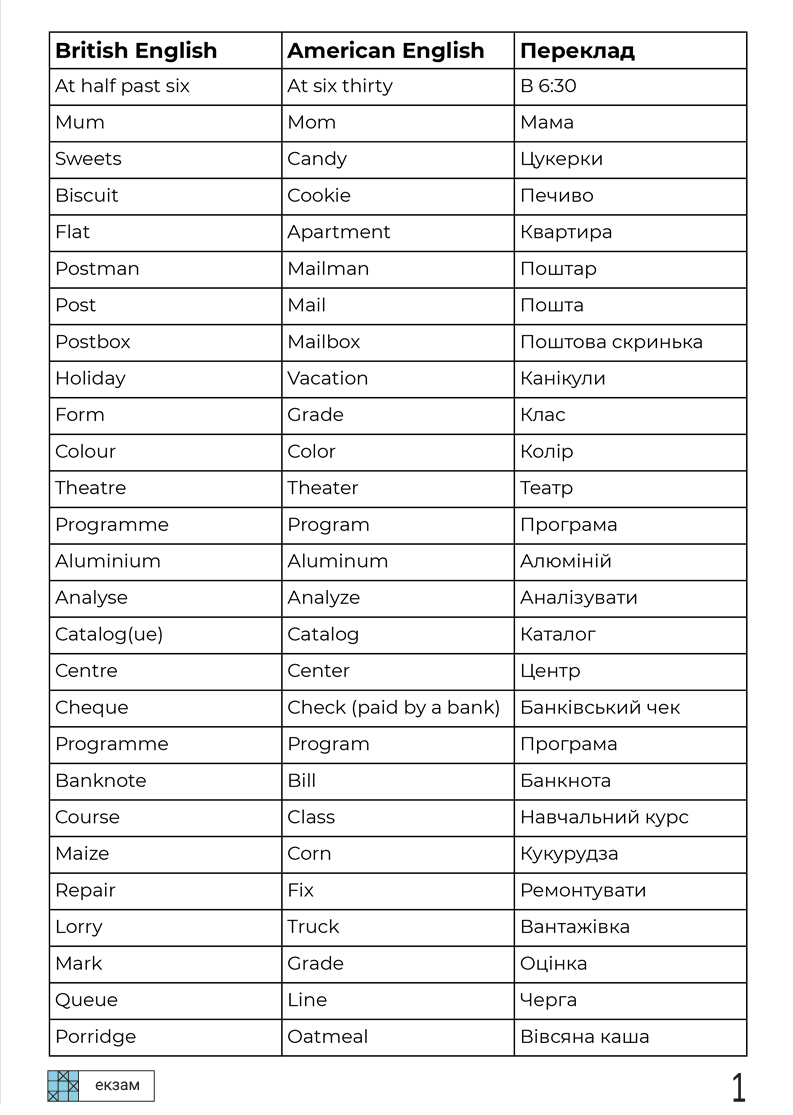 |
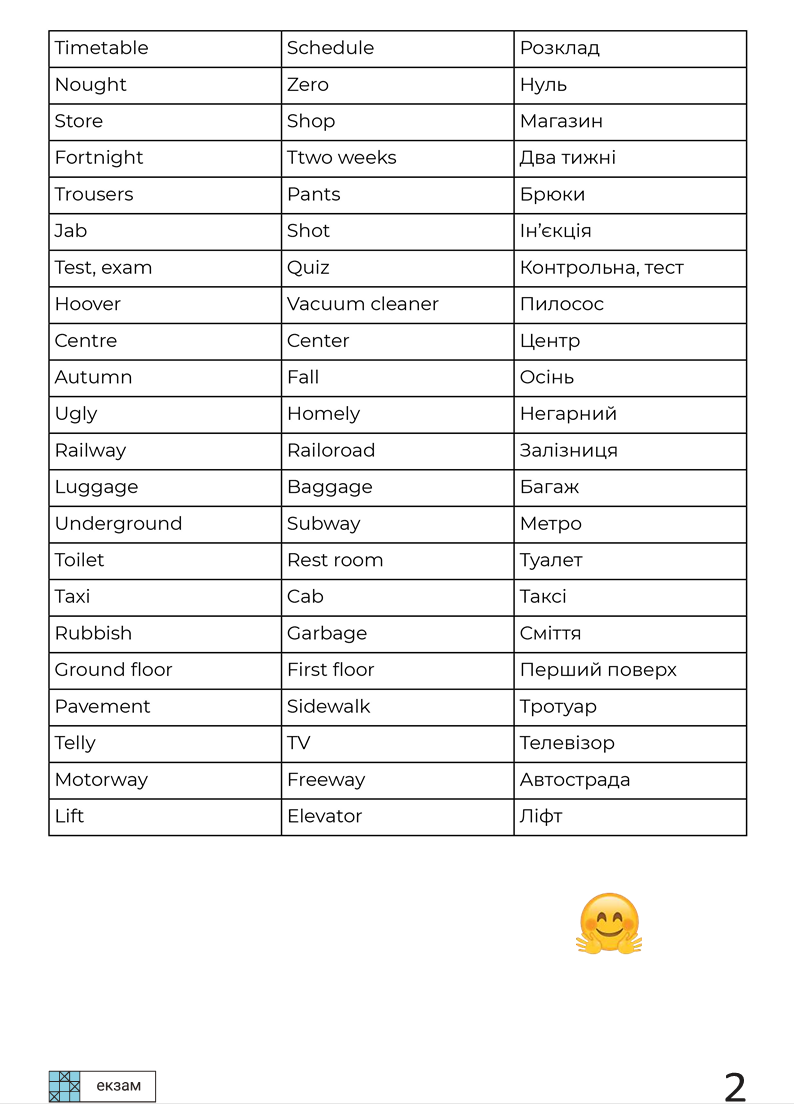
УМОВНІ РЕЧЕННЯ
Zero Conditional (нульовий тип)
![]() If + Present Simle
If + Present Simle
![]() Наукові факти, закони природи, загальноприйняті твердження.
Наукові факти, закони природи, загальноприйняті твердження.
![]() If you cut your finger with a knife, it hurts.
If you cut your finger with a knife, it hurts.
First Conditional (перший тип)

![]() If + Present Simle, Future Simle
If + Present Simle, Future Simle
![]() Дія, яка з великою ймовірність станеться, якщо виконати умову, а також якщо ми хочемо попередити або застерегти когось.
Дія, яка з великою ймовірність станеться, якщо виконати умову, а також якщо ми хочемо попередити або застерегти когось.
![]() You will find a good job if you study well.
You will find a good job if you study well.
Second Conditional (другий тип)
![]() If + Past Simle, + дієслово без to
If + Past Simle, + дієслово без to
![]() Дія, яка з великою ймовірність станеться, якщо виконати умову, а також якщо ми хочемо попередити або застерегти когось.
Дія, яка з великою ймовірність станеться, якщо виконати умову, а також якщо ми хочемо попередити або застерегти когось.
![]() You will find a good job if you study well.
You will find a good job if you study well.
![]() Малоймовірні або вигадані ситуація, яка відноситься до теперішнього або майбутнього часу. Шанс того, що це станеться - маленький, або взагалі нульовий.
Малоймовірні або вигадані ситуація, яка відноситься до теперішнього або майбутнього часу. Шанс того, що це станеться - маленький, або взагалі нульовий.
![]() I would never do this if I were you.
I would never do this if I were you.
УМОВНІ РЕЧЕННЯ
Third Conditional (третій тип)
![]() If + Past Perfect, would + Present Perfect
If + Past Perfect, would + Present Perfect
![]() Критика якоїсь дії, яка виникла у минулому і вже не можна змінити.
Критика якоїсь дії, яка виникла у минулому і вже не можна змінити.
![]() If you had listened carefully, you wouldn’t have made so many mistakes
If you had listened carefully, you wouldn’t have made so many mistakes
![]() Коли хочемо повідомити про хорошу подію, яка відбулася і минулому і позитивно вплинула на наше теперішнє.
Коли хочемо повідомити про хорошу подію, яка відбулася і минулому і позитивно вплинула на наше теперішнє.

![]() If I hadn’t taken the wrong way, I wouldn’t have met you
If I hadn’t taken the wrong way, I wouldn’t have met you
Mixed Conditional (змішанній тип)
![]() Поєднує другий і третій типи
Поєднує другий і третій типи
![]() If + Second Conditional, Third Conditional
If + Second Conditional, Third Conditional
(If + Past Simple, would + Present Perfect)
![]() Нереальна ситуація в минулому з умовою, дійсною для теперішнього
Нереальна ситуація в минулому з умовою, дійсною для теперішнього
![]() If I were clever enough, I wouldn’t have done this
If I were clever enough, I wouldn’t have done this
![]() If + Third Conditional, Second Conditional
If + Third Conditional, Second Conditional
(If + Past Perfect, would + дієслово без to)
![]() Нереальна ситуація в теперішньому і майбутньому з умовою в минулому
Нереальна ситуація в теперішньому і майбутньому з умовою в минулому ![]() If I had won that lottery, I would now live in France
If I had won that lottery, I would now live in France
|
Прикметники із закінченням ed/ing |
|||||||||||||||||||||||||||
|
Прикметник з обома закінченнями зазвичай утворюються від дієслова, і хоча мають різний переклад, їх легко сплутати.
Наприклад: it’s boring film – це НУДНИЙ фільм, «нудний» – ти оцінюєш цим словом когось або щось. I am bored – мені НУДНО, в українській мові цей прикметник стає прислівником, але суть та сама – це опис внутрішнього стану людини.
|
|||||||||||||||||||||||||||
|
|
|||||||||||||||||||||||||||||||||||||||||||||
|
|
||||||||||||||||||||||||||||||||||||||||||||||||||||||||||||
ІДІОМИ
їжа тварини час
egghead – розумник; big cheese – впливова людина; couch potato – нероба; tough cookie – хуліган; top banana – лідер; bad apple – негідник; eat one's words – брати назад свої слова; the apple of one's eye– зіниця ока; hard nut to crack – тяжка задача, міцний горішок; in a nutshell – коротко; have egg on one's face – виглядати нерозумно; as cool as a cucumber – холоднокровний; be full of beans – бути енергійним; as slow as molasses – дуже повільний; chew the fat – ляси точити;
sell like hot cakes– користуватися попитом; take something with a pinch of salt – не довіряти; bite off more than one can chew – переоцінити свої можливості; cry over spilt milk– сумувати по не виправному; hot potato – актуальна тема.
monkey business – безглузда робота; smell a rat – відчувати недобре; top dog – переможець; cash cow – джерело грошових коштів, дійная корова;

eager beaver– роботяга, ділова ковбаса; black sheep – біла ворона; elephant in the room – слона то я й не помітив, це очевидно; when pigs fly – щось у лісі здохне; like a cat on a hot tin roof – як муха в окропі; in the doghouse – в немилості; be as busy as a bee – працювати, як бджола; робити як віл;
let a cat out of the bag – випустити кота з мішка; horse around – клеяти дурня; as poor as a church mouse – бідний, як церковна миша; без копійки за душею; lion's share of something – левова частка; eat like a horse – бути голодним як вовк; have a tiger by the tail – кидати виклик долі;
hear it straight from the horse's mouth – з першоджерела;
butterflies in the stomach – ні живий, ні мертвий; like water off a duck's back – як з гусака вода. once in a blue moon – дуже рідко; behind the times – застарілий; time flies – час летить; the big time – великий успіх; around the clock – круглодобово; dwell on the past – жити минулим; have the time of one's life – відмінно провести час; crack of dawn – зі сходом сонця; run out of time – вичерпуватись; in the blink of an eye– в одну мить; like clockwork – без перебою; for donkey's years – с незапам’ятних часів; pressed for time – дуже поспішати; give someone a hard time – відчитувати; be ahead of time – випереджати; to have a whale of a time – чудово провести час; go with the times – йти в ногу з часом; on the spur of the moment – с наскоку; in broad daylight – серед білого дня; catch unawares – настигнуть зненацька.
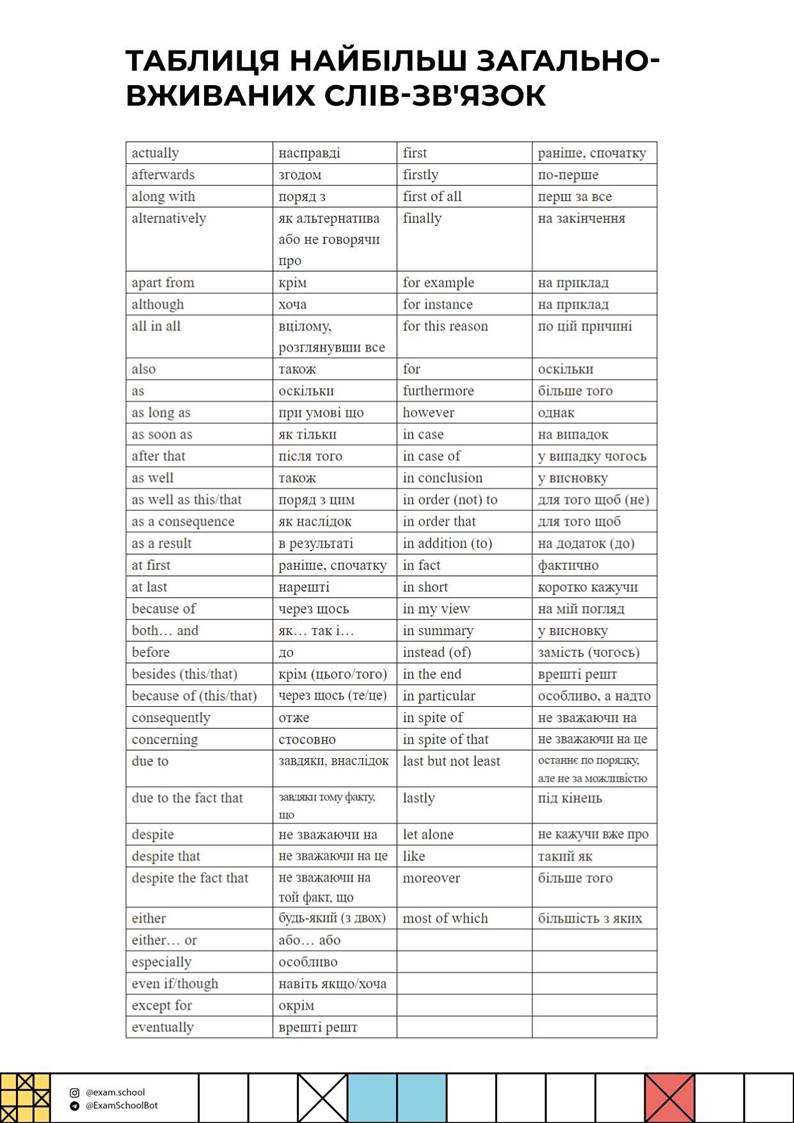
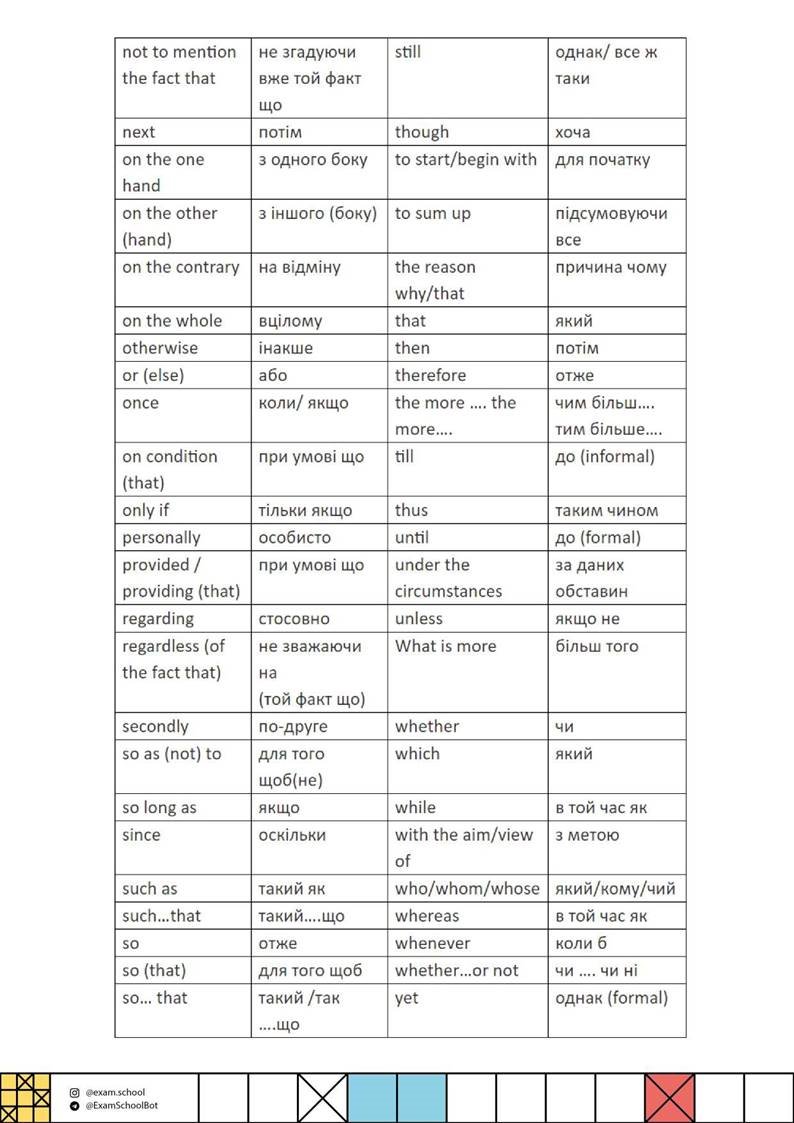
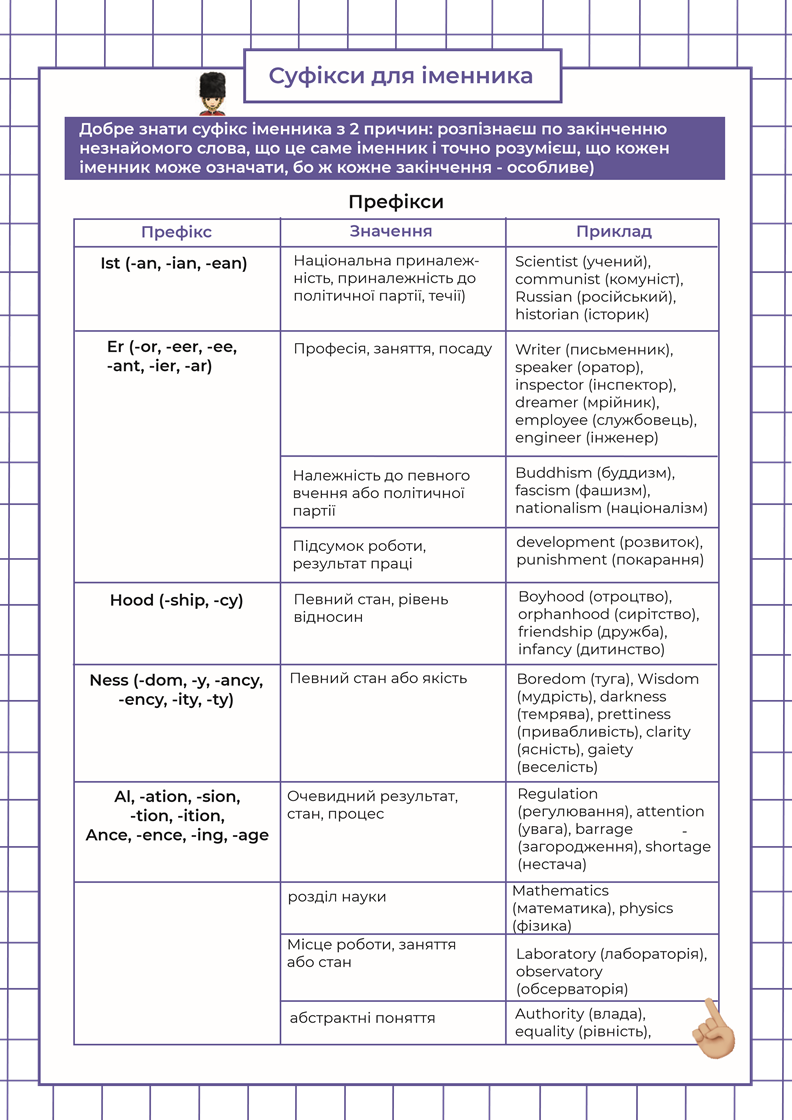
|
Топ-факти про числівник в англійській |
||||||||
|
||||||||
|
|
Simple Present |
Present Progressive |
Simple Past |
|
|
every day sometimes always often usually seldom never first ... then |
now at the moment Look! Listen! |
last ... ... ago in 1990 yesterday |
|
|
Something that happens repeatedly how often something happens one action follows another things in general with the following verbs (to love, to hate, to think, etc.) |
something is happening at the same time of speaking or around it future meaning: when you have already decided and arranged to do it (a fixed plan, date) |
action took place in the past, mostly connected with an expression of time (no connection to the present) |
|
|
Infinitive he/she/it + -s |
to be (am/are/is) + Infinitive + ing |
regular: Infinitive + -ed irregular: 2. Spalte |
|
|
I work. He works. I go. He goes. |
I'm working. He's working. I'm going. He's going. |
I worked. He worked. I went. He went. |
|
|
I don't work. He doesn't work. I don't go. He doesn't go. |
I'm not working. He isn't working. I'm not going. He isn't going. |
I didn't work. He didn't work. I didn't go. He didn't go. |
|
|
Do I work? Does he work? Do I go? Does he go? |
Am I working? Is he working? Am I going? Is he going? |
Did I work? Did he work? Did I go? Did he go? |
|
|
Past Progressive |
Simple Present Perfect |
Present Perfect Progressive |
|
|
while |
just yet never ever already so far up to now, since, for recently |
all day the whole day how long since for |
|
|
an action happened in the middle of another action. Someone was doing something at a certain time (in the past) - you don't know whether it was finished or not |
you say that sth. has happened or is finished in the past and it has a connection to the present action started in the past and continues up to the present |
action began in the past and has just stopped how long the action has been happening emphasis: length of time of an action |
|
|
was/were +Infinitive + -ing |
have/has + past participle* *(infinitive + -ed) or (3rd column of table of irregular verbs) |
have/has + been + Infinitive + -ing |
|
|
I was working. He was working. I was going. He was going. |
I have worked. He has worked. I have gone. He has gone. |
I have been working. He has been working. I have been going. He has been going. |
|
|
I wasn't working. He wasn't working. I wasn't going. He wasn't going. |
I haven't worked. He hasn’t worked. I haven't gone. He hasn’t gone. |
I haven't been working. He hasn't been working. I haven't been going. He hasn't been going. |
|
|
Was I working? Was he working? Was I going? Was he going? |
Have I worked? Has he worked? Have I gone? Has he gone? |
Have I been working? Has he been working? Have I been going? Has he been going? |
|
|
Simple Past Perfect |
Past Perfect Progressive |
will future |
|
|
already just never |
how long since for |
|
|
|
mostly when two actions in a story are related to each other: the action which had already happened is put into past perfect, the other action into simple past the past of the Present Perfect |
how long something had been happening before something else happened |
predictions about the future (you think that sth will happen) you decide to do sth. spontaneously at the time of speaking, you haven't made a main clause in type I of the if clauses |
|
|
had + past participle* *(infinitive + -ed) or (3rd column of table of irregular verbs) |
had + been + Infinitive + ing |
will + Infinitive |
|
|
I had worked. He had worked. I had gone. He had gone. |
I had been working. He had been working. I had been going. He had been going. |
I'll work. He'll work. I'll go. He'll go. |
|
|
I hadn't worked. He hadn't worked. I hadn't gone. He hadn't gone. |
I hadn't been working. He hadn't been working. I hadn't been going. He hadn't been going. |
I won't work. He won't work. I won't go. He won't go. |
|
|
Had I worked? Had he worked? Had I gone? Had he gone? |
Had I been working? Had he been working? Had I been going? Had he been going? |
Will I work? Will he work? Will I go? Will he go? |
|
|
going to future |
Future Progressive |
Future Perfect Simple |
|
|
|
|
|
|
|
when you have already decided to do sth. in the future what you think what will happen |
An action will be in progress at a certain time in the future. This action has begun before the certain time. Something happens because it normally happens. |
sth. will already have happened before a certain time in the future |
|
|
be (am/are/is) + going to + Infinitive |
will + be + Infinitive + ing |
will + have + past participle* *(infinitive + -ed) or (3rd column of table of irregular verbs) |
|
|
I'm going to work. He's going to work. I'm going to go. He's going to go. |
I'll be working. He'll be working. I'll be going. He'll be going. |
I'll have worked. He'll have worked. I'll have gone. He'll have gone. |
|
|
I'm not going to work. He's not going to work. I'm not going to go. He's not going to go. |
I won't be working. He won't be working. I won't be going. He won't be going. |
I won't have worked. He won't have worked. I won't have gone. He won't have gone. |
|
|
Am I going to work? Is he going to work? Am I going to go? Is he going to go? |
Will I be working? Will he be working? Will I be going? Will he be going? |
Will I have worked? Will he have worked? Will I have gone? Will he have gone? |
|
|
Future Perfect Progressive |
Conditional Simple |
Conditional Progressive |
|
|
|
|
|
|
|
sth. will already have happened before a certain time in the future emphasis: length of time of anaction |
sth. that might happen main clause in type II of the if clauses |
sth. that might happen emphasis: length of time of anaction |
|
|
will + have + been + Infinitive + ing |
would + Infinitive |
would + be + Infinitive + ing |
|
|
I'll have been working. He'll have been working. I'll have been going. He'll have been going. |
I would work. He would work. I would go. He would go. |
I would be working. He would be working. I would be going. He would be going. |
|
|
I won't have been working. He won't have been working. I won't have been going. He won't have been going. |
I wouldn't work. He wouldn't work. I wouldn't go. He wouldn't go. |
I wouldn't be working. He wouldn't be working. I wouldn't be going. He wouldn't be going. |
|
|
Will I have been working? Will he have been working? Will I have been working? Will he have been working? |
Would I work? Would he work? Would I work? Would he work? |
Would I be working? Would he be working? Would I be going? Would he be going? |
|

УСІ ЧАСИ В АНГЛІЙСЬКІЙ МОВІ
|
Conditional Perfect |
Conditional Perfect Progressive |
|
|
|
|
|
|
sth. that might have happened in the past (It's too late now.) main clause in type III of the if clauses |
sth. that might have happened in the past (It's too late now.) emphasis: length of time of an action |
|
|
would + have + past participle* *(infinitive + -ed) or (3rd column of table of irregular verbs) |
would + have + been + Infinitive + ing |
|
|
I would have worked. He would have worked. I would have gone. He would have gone. |
I would have been working. He would have been going. I would have been going. He would have been going. |
|
|
I wouldn't have worked. He wouldn't have worked. I wouldn't have gone. He wouldn't have gone. |
I wouldn't have been working. He wouldn't have been going. I wouldn't have been going. He wouldn't have been going. |
|
|
Would I have worked? Would he have worked? Would I have gone? Would he have gone? |
Would I have been working? Would he have been working? Would I have been going? Would he have been going? |
We sometimes use Continuous instead of Progressive. Some signal words can be found in more tenses. We did not list signal words in the future.
Always remember what action is described.
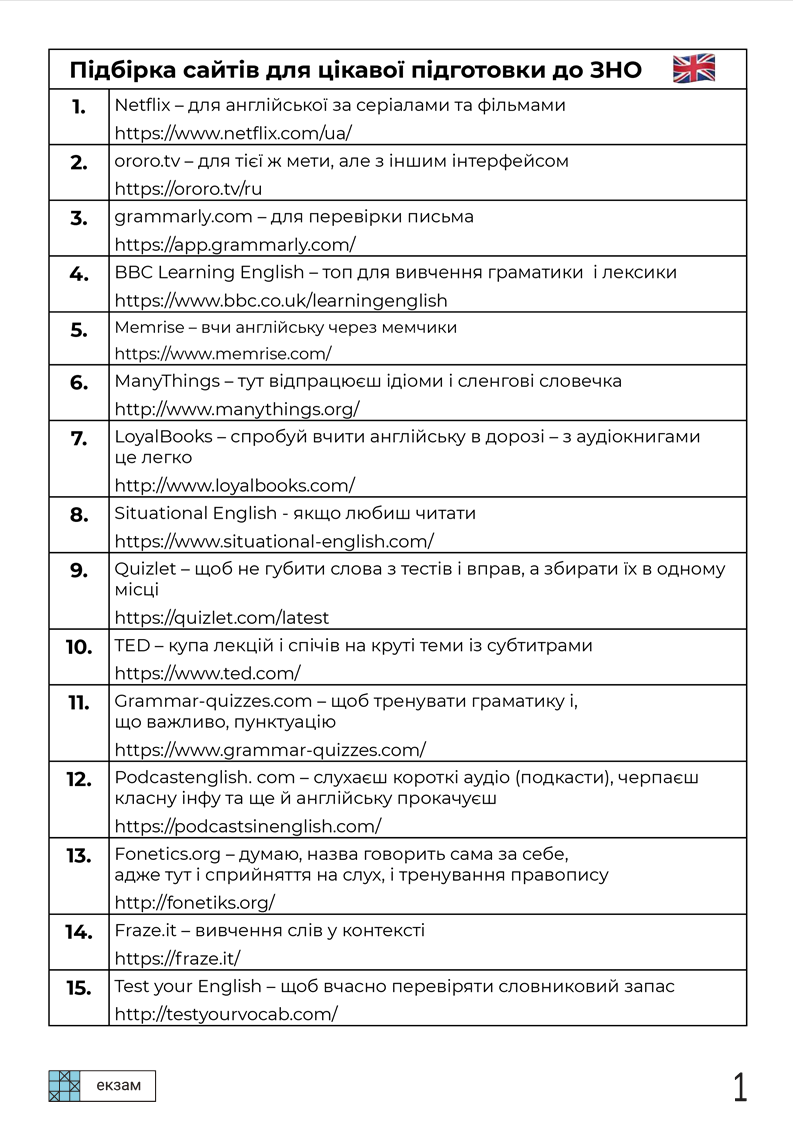


про публікацію авторської розробки
Додати розробку
